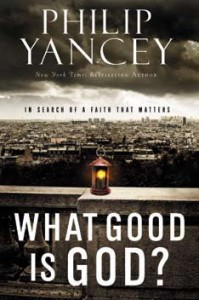Halfway through the second week of the year, I was pretty sure that my goal of reading one book a week during 2011 was toast. I had decided to read What Good is God? by Philip Yancey, and it looked that my downfall was going from a 56-page book in week 1 to a 287-page book in week 2. To my surprise, I finished it on Saturday evening to keep this goal alive for at least one more week. It helped that I was reading something by Yancey (who has been one of my favorite writers, and was also the speaker at my seminary graduation) and that it was compelling. The B99 had given this to me for Christmas and I found myself on more than once calling her in to hear portions of the book.
The format of the book follows Yancey’s travels to 10 areas in the world that were all experiencing some type of grief or suffering. He shares some of what he learned in each place and then includes the transcripts of speeches he delivered while there. The locales in the book range from the campus of Virginia Tech after the massacres to the underground church in China.
Some noteworthy excerpts from What Good is God?:
The Jews, schooled in Old Testament prophecies, had a saying, “Where Messiah is, there is no misery.” After Jesus you could change that saying to, “Where misery is, there is the Messiah.”
…pain redeemed impresses me more than pain removed.
David Aikman, former Beijing bureau chief for Time magazine, estimates that up to three thousand Western Christians work in China as English teachers, many of them vocal about their faith…Almost every urban young Christian I met in China had come to the Christian faith through a foreign, English-speaking teacher.
In a speech to faith-based addiction help groups entitled “Why I Wish I was an Alcoholic,” Yancey expressed appreciation to recovering alcoholics for the truths they had learned and could teach others, especially Christians. His last point – that they have a lot that they could teach about what the church can and should be – was concluded with the following:
I yearn for a grace-abounding church that rewards rather than punishes honesty, and that, in Jesus’ words, exists for the sinners and not the righteous, the sick and not the healthy.
He concluded that speech with a story about his friend, George, who gad been attending A.A. for 20 years because they took him in at his worst and told him to “keep coming back.” Yancey writes:
George sometimes gets a different response from his church friends. “Aren’t you done with that issue (alcoholism) yet?” they ask. And this is what George says: “I realize for the rest of my life, I can go to A.A. meetings and nobody will ask me, “Aren’t you finished with all this talk about your alcoholism?” They will just say, “Keep coming back – glad you could make it.”
May the church learn.
Indeed, Mr. Yancey. Indeed.



